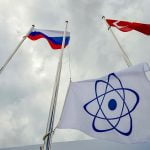Responding to the hardships and global energy market disruption caused by Russia’s invasion of Ukraine, the European Commission presented on May 18 the REPowerEU Plan, striving to end the EU’s dependence on Russian fossil fuels and tackling the climate crisis.
The EU has repeatedly said that the bloc’s dependency on Russian energy supplies allows Moscow to use them as an economic and political weapon and cost European taxpayers nearly €100 billion per year.
REPowerEU plans to transform Europe’s energy system. By acting as a Union, Europe can phase out its dependency on Russian fossil fuels faster, the Commission said, adding that 85% of Europeans believe that the EU should reduce its dependency on Russian gas and oil as soon as possible to support Ukraine. The measures in the REPowerEU Plan can respond to this ambition, through energy savings, diversification of energy supplies, and accelerated roll-out of renewable energy to replace fossil fuels in homes, industry and power generation, the EU Commission said in a press release.
The green transformation will strengthen economic growth, security, and climate action for Europe and our partners, the Commission said, adding that the Recovery and Resilience Facility (RRF) is at the heart of the REPowerEU Plan, supporting coordinated planning and financing of cross-border and national infrastructure as well as energy projects and reforms. The Commission proposed to make targeted amendments to the RRF Regulation to integrate dedicated REPowerEU chapters in Member States’ existing recovery and resilience plans (RRPs), in addition to the large number of relevant reforms and investments which are already in the RRPs. The country-specific recommendations in the 2022 European Semester cycle will feed into this process.
Energy savings are the quickest and cheapest way to address the current energy crisis and reduce bills, the Commission said, proposing to enhance long-term energy efficiency measures, including an increase from 9% to 13% of the binding Energy Efficiency Target under the Fit for 55 package of European Green Deal legislation. “Saving energy now will help us to prepare for the potential challenges of next winter,” the Commission said.
The EU Save Energy Communication published on May 18 details short-term behavioural changes which could cut gas and oil demand by 5% and encouraging Member States to start specific communication campaigns targeting households and industry. Member States are also encouraged to use fiscal measures to encourage energy savings, such as reduced VAT rates on energy efficient heating systems, building insulation and appliances and products. The Commission also set out contingency measures in case of severe supply disruption, and will issue guidance on prioritisation criteria for customers and facilitate a coordinated EU demand reduction plan.
Moreover, the EU has been working with international partners to diversify supplies for several months and has secured record levels of liquified natural gas (LNG) imports and higher pipeline gas deliveries. The newly created EU Energy Platform, supported by regional task forces, will enable voluntary common purchases of gas, LNG and hydrogen by pooling demand, optimising infrastructure use and coordinating outreach to suppliers, the Commission said. “As a next step, and replicating the ambition of the common vaccine purchasing programme, the Commission will consider the development of a ‘joint purchasing mechanism’ which will negotiate and contract gas purchases on behalf of participating Member States. The Commission will also consider legislative measures to require diversification of gas supply over time by Member States. The Platform will also enable joint purchasing of renewable hydrogen,” the press release read.
The EU External Energy Strategy adopted on May 18 will facilitate energy diversification and building long-term partnerships with suppliers, including cooperation on hydrogen or other green technologies, the Commission said. In line with the Global Gateway, the Strategy prioritises the EU’s commitment to the global green and just energy transition, increasing energy savings and efficiency to reduce the pressure on prices, boosting the development of renewables and hydrogen, and stepping up energy diplomacy.
In the Mediterranean and North Sea, major hydrogen corridors will be developed. “In the face of Russia’s aggression, the EU will support Ukraine, Moldova, the Western Balkans and Eastern Partnership countries, as well as our most vulnerable partners. With Ukraine we will continue to work together to ensure security of supply and a functioning energy sector, while paving the way for future electricity and renewable hydrogen trade, as well as rebuilding the energy system under the REPowerUkraine initiative,” the Commission said.
It also called for accelerating the rollout of renewables. “A massive scaling-up and speeding-up of renewable energy in power generation, industry, buildings, and transport will accelerate our independence, give a boost to the green transition, and reduce prices over time. The Commission proposed to increase the headline 2030 target for renewables from 40% to 45% under the Fit for 55 package,” the Commission said.
The EU’s executive arm also called for reducing fossil fuel consumption in industry and transport.








